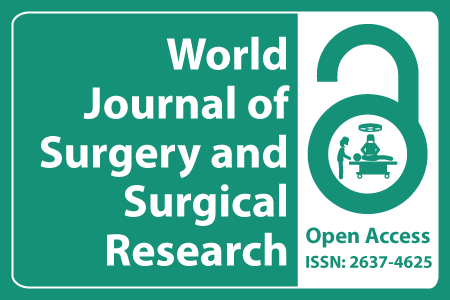
Journal Basic Info
- Impact Factor: 1.989**
- H-Index: 6
- ISSN: 2637-4625
- DOI: 10.25107/2637-4625
Major Scope
- Bariatric Surgery
- Urological Surgery
- Dental Surgery
- Plastic Surgery
- Cancer Surgery
- Anesthesiology
- Orthopaedic Surgery
- Endocrine Surgery
Abstract
Citation: World J Surg Surg Res. 2021;4(1):1313.DOI: 10.25107/2637-4625.1313
Evaluation of Efficacy in Different Treatments for Glioblastoma: A Surveillance, Epidemiology, and End Results Cohort Study
Boya Fan1,2, Gang Wang1, Haolun Han1, Baowei Li1, Lei Wang1, Zhezhe Sun1, Ying Zhou1, Yiyan Zhang1 and Wei Wu1*
1Department of Otorhinolaryngology-Head and Neck Surgery, PLA Strategic Support Force Characteristic Medical
Center, China
2Peking University Health Science Center, China
PDF Full Text Research Article | Open Access
Abstract:
Background: Clinical trials have shown that surgery, Radiotherapy (RT), and Chemotherapy
(CT) are different treatment options for Glioblastoma (GBM) patients. In this study, we evaluate
the efficacy of different choices of treatments on survival in GBM patients using the Surveillance,
Epidemiology, and End Results (SEER) database.
Methods: A large-scale retrospective cohort study using the U.S. National Cancer Institute's SEER
analysis was conducted. A total of 23,829 eligible glioblastoma patients between 2004 and 2016 were
identified within SEER database. We used the Kaplan–Meier (KM) survival analysis with a log-rank
test to evaluate the survival outcomes in surgery, RT, and CT choices. A multivariate stepwise Cox
analyses to identify factors associated with Overall Survival (OS).
Results: Whether or not surgery was performed, survival was best with radiotherapy and
chemotherapy, and chemotherapy alone was better than radiotherapy alone. If patients chose
only two treatments, patients who had surgery and chemotherapy had the best survival rates. It
shows that chemotherapy plays an important role in the treatment of glioblastoma. In patients who
have had chemotherapy, additional surgery is better than radiotherapy. In patients who have had
radiotherapy, additional surgery and chemotherapy have similar outcomes. Survival was better
with chemotherapy alone than with the other two treatments alone. Patients’ age and tumor size
were negatively correlated with survival time, and tumor size was weakly negatively correlated
with patient age. In multivariate analysis of OS, OS was significantly correlated with race, age of
diagnosis, tumor size, marital status, extension, surgery, radiotherapy, and chemotherapy.
Conclusion: We constructed the first treatment evaluation of OS in patients with glioblastoma. The
advantages of surgery and chemotherapy in survival are obvious. The correlation and regression
results are intended for risk assessment.
Keywords:
Glioblastoma; SEER database; Survival; Therapy; Prognosis
Cite the Article:
Fan B, Wang G, Han H, Li B, Wang L, Sun Z, et al. Evaluation of Efficacy in Different Treatments for Glioblastoma: A Surveillance, Epidemiology, and End Results Cohort Study. World J Surg Surgical Res. 2021; 4: 1313..













